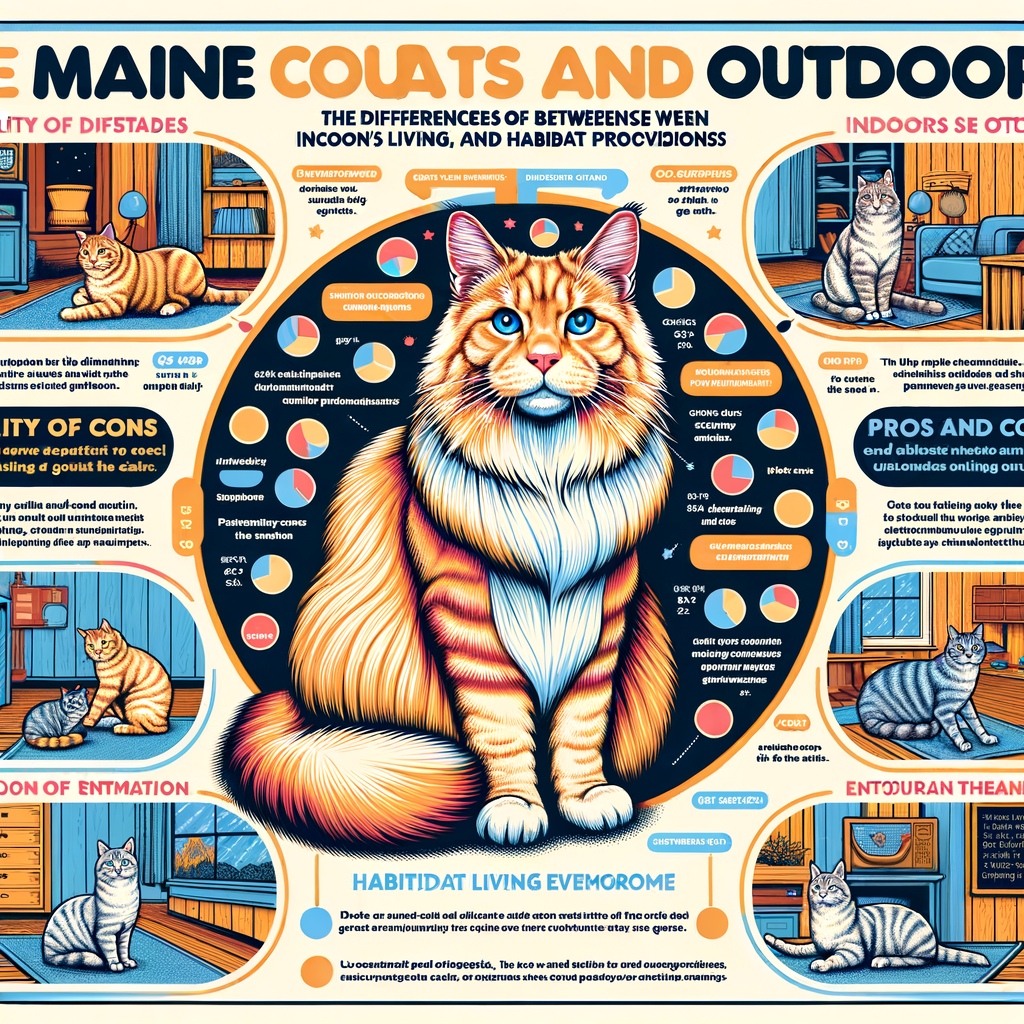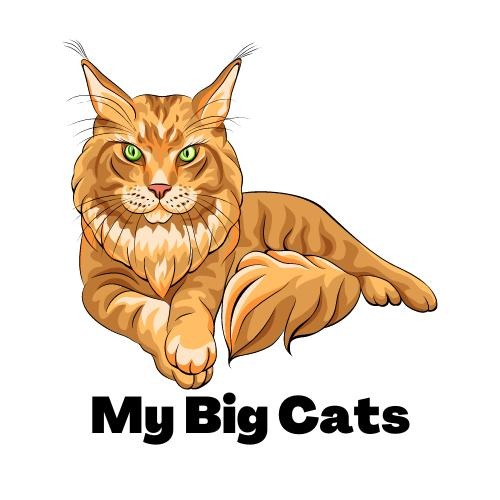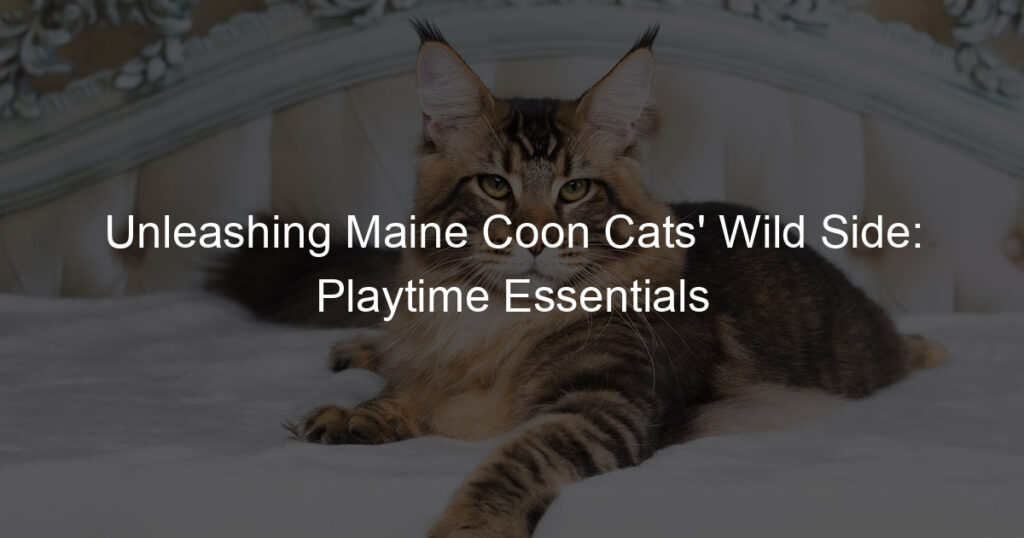
Introduction to Maine Coon Cats
Maine Coon cats are a popular breed known for their large size, fluffy tails, and friendly personalities. In this post, we will delve into the world of Maine Coon cats, exploring their lifestyle and care needs.
-
Overview of Maine Coon Cats
Maine Coon cats, often referred to as ‘gentle giants’, are one of the largest domesticated cat breeds. Originating from Maine, United States, they are known for their muscular bodies, bushy tails, and tufted ears. They have a distinctive physical appearance with a variety of coat colors and patterns. Their lifespan typically ranges from 9 to 15 years.
Despite their large size, Maine Coons are known for their gentle and friendly nature. They are intelligent, playful, and get along well with children and other pets, making them a perfect choice for families.
-
Maine Coon Cats Lifestyle
Maine Coon cats are active and playful. They enjoy interactive play and activities that stimulate their minds. Despite their size, they are agile climbers and enjoy high vantage points. They are also known for their ‘dog-like’ behavior, often following their owners around the house.
They are not overly demanding for attention, but they do enjoy the company of their human family. They are also known for their unique vocalizations, often communicating with their owners through trills, chirps, and coos.
-
Maine Coon Cats Care
Caring for a Maine Coon cat involves a balanced diet, regular exercise, and grooming. Their long, thick fur requires regular brushing to prevent matting and hairballs. They also need plenty of fresh water and high-quality cat food to maintain their health.
Regular vet check-ups are essential to monitor their health, as Maine Coons are prone to certain genetic health issues like hip dysplasia and heart disease. Providing them with plenty of toys and a stimulating environment can help keep them mentally and physically active.
In the following sections, we will delve deeper into the indoor and outdoor living conditions suitable for Maine Coon cats, and compare the two to help you decide what’s best for your feline friend.
Indoor Living for Maine Coon
Maine Coon cats are known for their majestic size and playful nature. While they can adapt to both indoor and outdoor environments, indoor living offers several benefits for these felines. Let’s delve into the advantages of keeping your Maine Coon indoors.
Benefits of Indoor Living for Maine Coon
Indoor living can offer a safer, healthier, and more interactive environment for your Maine Coon. Here are some of the key benefits:
- Safety from outdoor hazards: Living indoors keeps your Maine Coon safe from potential outdoor threats like traffic, predators, and harmful substances. According to a study, indoor cats tend to live longer due to reduced exposure to these risks.
- Controlled diet and health care: Indoor living allows you to monitor your cat’s diet closely, ensuring they get the right nutrients. Regular vet check-ups become easier, helping prevent health issues early on.
- Interaction and bonding with family: Maine Coons are sociable creatures. Keeping them indoors provides more opportunities for interaction and bonding, enhancing their emotional well-being.
While indoor living offers numerous benefits, it’s crucial to provide your Maine Coon with a stimulating environment to keep them active and healthy. This includes toys, scratching posts, and regular playtime with family members.
Challenges of Indoor Living for Maine Coon
While indoor living offers numerous benefits for Maine Coon cats, it also presents a few challenges. Let’s delve into these challenges to better understand how to create an optimal indoor environment for your Maine Coon.
- Need for Mental Stimulation and Exercise
- Potential for Obesity
- Importance of Providing a Stimulating Environment
Maine Coons are known for their playful and curious nature. They require plenty of mental stimulation and physical exercise to keep them happy and healthy. Without it, they can become bored and potentially develop behavioral problems. Indoor living often limits their opportunities for exploration and hunting, activities they would naturally engage in outdoors.
Indoor cats, including Maine Coons, are at a higher risk of becoming overweight or obese. This is often due to a lack of physical activity and overfeeding. According to the Association for Pet Obesity Prevention, about 60% of cats in the U.S. were classified as overweight or obese in 2018. Obesity can lead to various health issues, such as diabetes, heart disease, and arthritis.
Creating a stimulating environment for your Maine Coon is crucial to combat boredom and promote physical activity. This can be challenging in an indoor setting. It involves providing various toys, climbing trees, scratching posts, and interactive activities. Without such an environment, Maine Coons may resort to destructive behaviors or become depressed.
In conclusion, while indoor living can provide a safe and controlled environment for Maine Coons, it also presents challenges that need to be addressed. By understanding these challenges, you can take the necessary steps to ensure your Maine Coon leads a healthy and fulfilling life indoors.
Maine Coon Indoor Care
When it comes to caring for your Maine Coon cat indoors, there are three key areas to focus on: feeding, grooming, and health checks. Let’s dive into each of these areas to ensure your Maine Coon cat remains healthy and happy.
-
Feeding
Maine Coon cats are known for their large size, and they need a diet that supports their growth and energy levels. A balanced diet rich in protein is essential. While wet food is a great source of hydration, dry food can help keep their teeth clean. Remember, every cat is unique, so it’s important to monitor your Maine Coon’s weight and adjust their food intake as necessary. Always provide fresh water for your cat.
-
Grooming
Maine Coon cats have long, thick fur that requires regular grooming. Brushing your cat’s coat at least once a week can help prevent matting and hairballs. It’s also a good time to check for any skin issues. Don’t forget to regularly check and clean their ears and teeth. Nail trimming is also essential, especially for indoor cats.
-
Health checks
Regular health checks are vital to catch any potential issues early. Your vet can provide vaccinations, flea and worm treatments, and regular health check-ups. Keep an eye out for changes in your Maine Coon’s behavior or appearance as these could be signs of health issues. Regular play and exercise are also important for your cat’s overall health.
In conclusion, taking care of a Maine Coon cat indoors involves a balanced diet, regular grooming, and health checks. By focusing on these areas, you can ensure your Maine Coon cat lives a long, healthy, and happy life.
Outdoor Living for Maine Coon
Maine Coon cats are known for their love of the outdoors. They are a breed that thrives in an environment where they can explore, play, and engage with nature. Let’s delve into the benefits of outdoor living for Maine Coon cats.
Benefits of Outdoor Living for Maine Coon
Outdoor living offers a variety of benefits to Maine Coon cats. Here are the top three:
- Natural stimulation and exercise
- Opportunity for natural behaviors
- Increased independence
Maine Coon cats are active and playful. The outdoors provides them with plenty of opportunities to run, jump, and climb. This natural stimulation keeps them physically fit and mentally sharp. They can chase butterflies, climb trees, and explore their surroundings, all of which contribute to their overall well-being.
Living outdoors allows Maine Coon cats to exhibit their natural behaviors. They can hunt small insects, scratch tree trunks, and mark their territory. These activities are essential for their mental health as they fulfill their instinctual needs.
Outdoor living fosters independence in Maine Coon cats. They learn to navigate their environment, make decisions, and solve problems on their own. This independence can contribute to their confidence and self-esteem.
In conclusion, outdoor living can be highly beneficial for Maine Coon cats. It provides them with natural stimulation, opportunities for natural behaviors, and fosters independence. However, it’s important to ensure their safety and well-being while they explore the great outdoors.
Challenges of Outdoor Living for Maine Coon
While outdoor living can offer a Maine Coon cat a sense of freedom and natural stimulation, it also presents several challenges. Let’s delve into some of these potential issues.
- Risks from Traffic, Predators, and Disease
- Exposure to Weather Extremes
- Increased Grooming Needs
Maine Coon cats are naturally curious and adventurous. However, their explorations can expose them to risks such as traffic, predators, and diseases. Busy roads can pose a significant danger to these cats. Predators such as coyotes, foxes, and even large birds of prey can also be a threat. Additionally, outdoor cats are more likely to encounter other animals carrying diseases, increasing their risk of infection.
Maine Coon cats have a thick, water-resistant coat that helps them withstand colder temperatures. However, they can still be affected by extreme weather conditions. Prolonged exposure to harsh winter weather can lead to frostbite, while hot summer days can result in heatstroke. Therefore, it’s crucial to provide them with a safe, sheltered space where they can escape from the elements.
Outdoor living can lead to increased grooming needs for Maine Coon cats. Their long, thick fur can easily pick up dirt, leaves, and other outdoor debris, requiring more frequent grooming to keep their coat clean and healthy. Additionally, outdoor cats are more prone to fleas and ticks, which require regular checks and treatments to prevent.
In conclusion, while outdoor living can provide a stimulating environment for a Maine Coon, it also comes with its share of challenges. As a responsible pet owner, it’s essential to weigh these factors and make an informed decision about your cat’s living arrangements.
Maine Coon Outdoor Care
When it comes to caring for your Maine Coon in an outdoor environment, there are three key areas to focus on: feeding, grooming, and health checks. Let’s delve into each of these areas to ensure your furry friend stays healthy and happy.
- Feeding
- Grooming
- Health checks
Feeding your Maine Coon properly is crucial for their health and wellbeing. Outdoor cats tend to be more active and thus, may require more food compared to indoor cats. It’s important to provide a balanced diet that includes both dry and wet food. Dry food helps maintain dental health, while wet food keeps them hydrated. Always ensure fresh water is available, especially during hot weather.
Maine Coons are known for their long, luxurious fur. While this fur is beautiful, it can also become matted and dirty, especially in an outdoor environment. Regular brushing is necessary to keep their coat clean and prevent matting. Check their ears and paws regularly for any signs of dirt or infection. During warmer months, it’s a good idea to check for ticks and fleas as well.
Regular health checks are essential for outdoor Maine Coons. They are more exposed to potential health risks such as parasites, diseases, and injuries. Regular visits to the vet for vaccinations and check-ups will help catch any potential issues early. It’s also important to monitor your cat’s behavior and physical condition. Changes in appetite, energy levels, or unusual behaviors can be signs of health problems.
In conclusion, while outdoor living can provide a stimulating environment for your Maine Coon, it also requires vigilant care in terms of feeding, grooming, and health checks. With the right care, your Maine Coon can thrive and enjoy the great outdoors.
Indoor vs Outdoor Cats: A Comparative Analysis
When it comes to the lifestyle of Maine Coon cats, there are two primary options: indoor living and outdoor living. Both have their unique benefits and drawbacks. In this section, we will compare the lifespan, health issues, and behavior and temperament of indoor and outdoor cats.
-
Comparison of Lifespan
Generally, indoor cats tend to have a longer lifespan compared to outdoor cats. Indoor cats usually live between 13 to 17 years, while outdoor cats have an average lifespan of 5 to 7 years. This is mainly because indoor cats are less exposed to dangers such as traffic, predators, and harsh weather conditions.
-
Comparison of Health Issues
Indoor cats are less likely to contract diseases or get injured compared to outdoor cats. They are not exposed to parasites like fleas and ticks, or contagious diseases from other animals. However, indoor cats are more prone to obesity and related health issues due to less physical activity. On the other hand, outdoor cats, while having more exercise, are more likely to contract diseases and suffer injuries.
-
Comparison of Behavior and Temperament
Indoor cats are generally more relaxed and less aggressive than outdoor cats. They are used to human interaction and are less likely to exhibit wild behavior. Outdoor cats, on the other hand, tend to be more independent and territorial. They may also exhibit more natural hunting behaviors.
In conclusion, whether to keep your Maine Coon cat indoors or outdoors depends on various factors such as your living situation, the cat’s health, and your personal preference. Both lifestyles have their pros and cons, and it’s important to make an informed decision that will ensure the happiness and well-being of your feline friend.
Maine Coon Cats Habitat: Indoor vs Outdoor
When it comes to the habitat of Maine Coon cats, there are two main options: indoor and outdoor. Both environments have their own unique requirements and benefits. Let’s explore these in detail.
- Indoor habitat requirements
- Outdoor habitat requirements
- Transitioning from indoor to outdoor, and vice versa
Maine Coon cats are known for their size and playful nature. Therefore, they need ample space inside the house to move around and play. A cat tree or a cat condo is a great addition to their indoor habitat. It provides them with a place to climb, scratch, and rest. Also, they need a clean litter box, fresh water, and nutritious food. Indoor cats also require plenty of toys and interactive activities to keep them mentally stimulated.
Outdoor Maine Coon cats require a safe and secure environment. They should have access to a sheltered area to protect them from harsh weather conditions. It’s also important to provide them with a clean water source and regular meals. Regular health check-ups are crucial for outdoor cats due to their exposure to various outdoor elements and potential health risks.
Transitioning a Maine Coon cat from an indoor to an outdoor environment, or vice versa, should be done gradually. If you’re transitioning your cat to an outdoor environment, start by letting them out for short periods under your supervision. Gradually increase the time they spend outside. On the other hand, if you’re transitioning your cat to an indoor environment, provide them with plenty of indoor stimulation. This can be achieved through toys, scratching posts, and interactive playtime.
In conclusion, whether you choose an indoor or outdoor habitat for your Maine Coon cat, it’s important to ensure that their needs are met. This includes providing them with a safe and stimulating environment, regular meals, clean water, and regular health check-ups.
Conclusion: What’s Best for Your Maine Coon Cat?
Deciding what’s best for your Maine Coon cat can be a challenging task. It involves considering various factors, understanding your cat’s unique needs, and making an informed decision. Here, we will discuss the key considerations, share personal experiences and case studies, and summarize the key takeaways.
- Considerations for deciding between indoor and outdoor
- Personal experiences and case studies
- Key takeaways
When deciding between an indoor or outdoor lifestyle for your Maine Coon, consider factors like safety, health, and your cat’s personality. Indoor cats are generally safer from dangers like traffic, predators, and diseases. However, outdoor cats often enjoy more physical activity and stimulation. If your cat is adventurous and active, they might prefer the outdoors. On the other hand, a more laid-back cat might be happier indoors.
Many Maine Coon owners have shared their experiences to help others make this decision. For example, one owner found that their Maine Coon was happier and healthier living indoors with regular play sessions for exercise. Another owner found that their Maine Coon thrived in an outdoor environment, enjoying the freedom and stimulation. These experiences show that what’s best depends on the individual cat.
In conclusion, the best lifestyle for your Maine Coon depends on various factors. Safety and health are crucial considerations, but so is your cat’s happiness and well-being. Whether you choose an indoor or outdoor lifestyle, ensure your cat gets plenty of exercise and stimulation. Remember, every Maine Coon is unique, and what works for one might not work for another.
Ultimately, the decision is yours. Use the information and experiences shared in this article to make an informed decision that suits both you and your Maine Coon cat.








